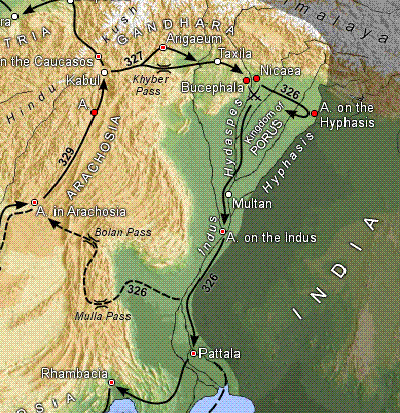Gujjars During :
3.3 Malavas
The name Malava is now applied generally to the old Central India Agency including the former Gwalior, Indore, Dhar, Bhopal and other States together with some contiguous areas of the old Central Provinces such as the Saugor District. After India’s independence, many of the said Native States were merged in the State of Madhya Bharat which was itself merged at a later date in the State of Madhya Pradesh.
In the fourth century b.c., when Alexander invaded the north-western regions of India, the Malavas (called Malloi by the Greeks) lived in the land lying to the north of the confluence of the Ravi and the Chenab and were probably confederated with the Ksudrakas (called Oxydrakai by the Greeks) inhabiting the Montgomery region of the Punjab.

Map 3.3 Root followed by Alexander the Great
The association of the Malavas and Ksudrakas is known to the “Mahabharata” and to the early grammarians who class these tribes among peoples living by the profession of arms. Both Malavas and Kshudrakas were defeated by Alexander one after the other.
From the Punjab, the Malavas, or at least a large section of the tribe, migrated to Rajasthan. This movement may have begun during the Indo-Greek occupation of the Punjab (Called Fun-jab by the Greeks), but appears to have continued down to the time of the Scythian conquest of that country. The Malavas of Rajasthan are the earliest Indian people known to have used an era which has been identified with the so-called Vikrama-Samvat of 58 b. c.
The name Avanti or Avanti is derived from that of the Avanti people said to be the descendants of Avanti, the son of Kartavirya Arjuna of the Yadava-Haihaya clan.
3.3.1 Maukharis
Maukharis, known from the Badva inscriptions3 of 238 AD acknowledged the supremacy of the Malava republic and belonged to the Malava stock. Epigraphic evidence represents the Mukhara or Maukhari princes as descendants of the hundred sons whom king Asvapati obtained through the grace of Vaivasvata (Yama),4 while the Mahabhrata states how the Madra king Asvapati obtained one hundred sons called ‘the Malavas’ through his queen Malay.